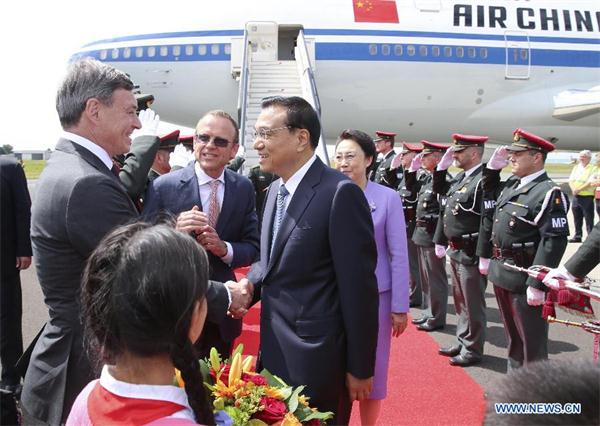 |
|
Chinese Premier Li Keqiang arrives in Brussels for the 17th China-EU leaders' meeting, Belgium, June 28, 2015. [Xinhua/Pang Xinglei] |
The partnership between China and the European Union has just reached 40 years. Our relations have advanced considerably since their tame beginnings into a dialogue that is one of the most frequent, extensive and diverse of the EU's 10 strategic partnerships.
The latest concrete examples of our fruitful cooperation are the conclusion of the EU-China 2020 Agenda and the launch of investment talks in 2013. These are ambitious projects, a sign of the belief and faith both sides have in furthering cooperation.
We believe in the cooperation's value because it is an essential component in finding answers to global concerns, such as global and regional security, the economic crisis, global financial and market regulation, energy security, weapons of mass destruction, climate change, and the fight against organized crime, terrorism and piracy. For this reason it is obvious this relationship must be nurtured and used wisely.
China, without doubt, is one of the key foreign policy priorities of my presidency of the European Parliament. I was glad to make an official visit to China in March and meet with Chinese President Xi Jinping after having received him at the European Parliament during a landmark visit last year. My meetings with Premier Li Keqiang in Hamburg last year and Brussels this year helped advance our relationship even further.
This positive momentum must be maintained. We must make sure we can systematically go from words to deeds. This will be important, especially on trade and investment issues, the human rights dimension, and global issues such as climate change and global economic governance.
The new European Parliament will maintain a high interest in developments in China, and there is considerable scope for strengthening parliamentary ties between the EU and China.
Trade and investment will continue to be an area where more can be achieved. I hope that both sides can maintain the good progress in negotiations on the Bilateral Investment Agreement. This agreement will not only facilitate investment, but also open the door to further agreements on trade in goods and services.
Another important area where more can be done is on the EU-China Human Rights Dialogue. I would like us to be able to talk more openly and sincerely on the human rights dimension.
The EU and China also share a vision of a multilateral world and face common global challenges, so it is logical that we should work together on many international issues. An obvious area where we will need to step up our cooperation is on climate change issues.
China has an important role to play on the international stage and shows signs of good leadership in its immediate region. For example, it was a key player in defusing the political and military escalation in the Korean Peninsula this year. It will be important now for China to commit constructively in the territorial disputes in the South and East China Seas.
On the international scene, the EU and China already work together in the areas of conflict prevention, crisis management and post-conflict stabilization, and cooperation is positive, especially on Iran and the Korean peninsula.
I believe that our fruitful dialogue with China is a continuous and on-going process that also stretches into Europe's regional cooperation with the Asian continent. The Europe-Asia meetings are an important platform for the EU to reinforce its relations with Asia as a whole, and with China, too. I believe our sessions with bodies such as the Asia-Europe Parliamentary Partnership and Asia-Europe Business Forum during the Europe-Asia meetings will deliver fresh ideas to deepen our cooperation.
Despite the well-established ties between China and the EU, there are plenty of opportunities for further partnership. The Europe-Asia meetings have in the past given fresh momentum to our dialogues, and I am sure this will be the case this year.
This positive momentum must be maintained. There will certainly be difficult times, but if there were not then this would be a sign that our relationship was not deep enough. Our job is not to avoid difficult subjects, but to find good solutions to them.
With commitment and resolute dialogue, I am sure we can succeed. I am committed to contribute toward this. We must make sure we can systematically go from words to deeds, and this will require effort from all parties.
The author is president of European Parliament.

I’ve lived in China for quite a considerable time including my graduate school years, travelled and worked in a few cities and still choose my destination taking into consideration the density of smog or PM2.5 particulate matter in the region.